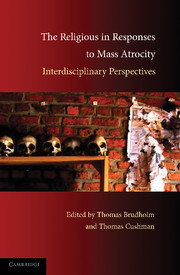Book contents
- Frontmatter
- Contents
- List of Contributors
- Acknowledgments
- Introduction: The Religious in Responses to Mass Atrocity
- Part I Between Necessity and Impossibility: The Role of Religion in the Face of Atrocity
- 1 Religious Rhetoric in Responses to Atrocity
- 2 The Limit of Ethics – The Ethics of the Limit
- 3 The Intolerability of Meaning: Myth, Faith, and Reason in Philosophical Responses to Moral Atrocity
- Part II Does It Help to Import Religious Ideas: Reflections on Punishment, War, and Forgiveness
- Part III Sociologies of the Religious in Responses to Mass Atrocities
- Index
3 - The Intolerability of Meaning: Myth, Faith, and Reason in Philosophical Responses to Moral Atrocity
Published online by Cambridge University Press: 01 September 2009
- Frontmatter
- Contents
- List of Contributors
- Acknowledgments
- Introduction: The Religious in Responses to Mass Atrocity
- Part I Between Necessity and Impossibility: The Role of Religion in the Face of Atrocity
- 1 Religious Rhetoric in Responses to Atrocity
- 2 The Limit of Ethics – The Ethics of the Limit
- 3 The Intolerability of Meaning: Myth, Faith, and Reason in Philosophical Responses to Moral Atrocity
- Part II Does It Help to Import Religious Ideas: Reflections on Punishment, War, and Forgiveness
- Part III Sociologies of the Religious in Responses to Mass Atrocities
- Index
Summary
In recent years the philosopher and social theorist Jürgen Habermas, long known for his championing of Enlightenment ideals, has begun to endorse the suggestion that the erosion of the “power of articulation” of religious traditions has left a gap in the ethical vocabulary of predominantly postreligious, individualistic, modern societies. “Secular languages,” Habermas claims, “which simply eliminate what was once intended leave behind feelings of discomfort. As sin was transformed into guilt, and the transgression of divine commands into the breaking of human laws, something was lost.” If we enquire more specifically what has been lost, then Habermas's answer seems to be the eye-opening and heart-opening, the ethically inspirational power of symbolic modes of expression, such as religion once made available to many. Habermas, in fact, has become increasingly concerned that, no matter how deeply the aspiration to universal justice may be anchored in modern consciousness, as an ideal it is simply too abstract and formal to inspire the level of commitment required to advance humankind toward it. In his view, “Pure practical reason can no longer be so confident of countering a process of modernization which is running out of control, empty-handed except for the insights of a theory of justice. For such a theory lacks the creativity of linguistic world disclosure, which would enable it to regenerate a normative consciousness which is withering on all sides.”
- Type
- Chapter
- Information
- The Religious in Responses to Mass AtrocityInterdisciplinary Perspectives, pp. 60 - 76Publisher: Cambridge University PressPrint publication year: 2009



